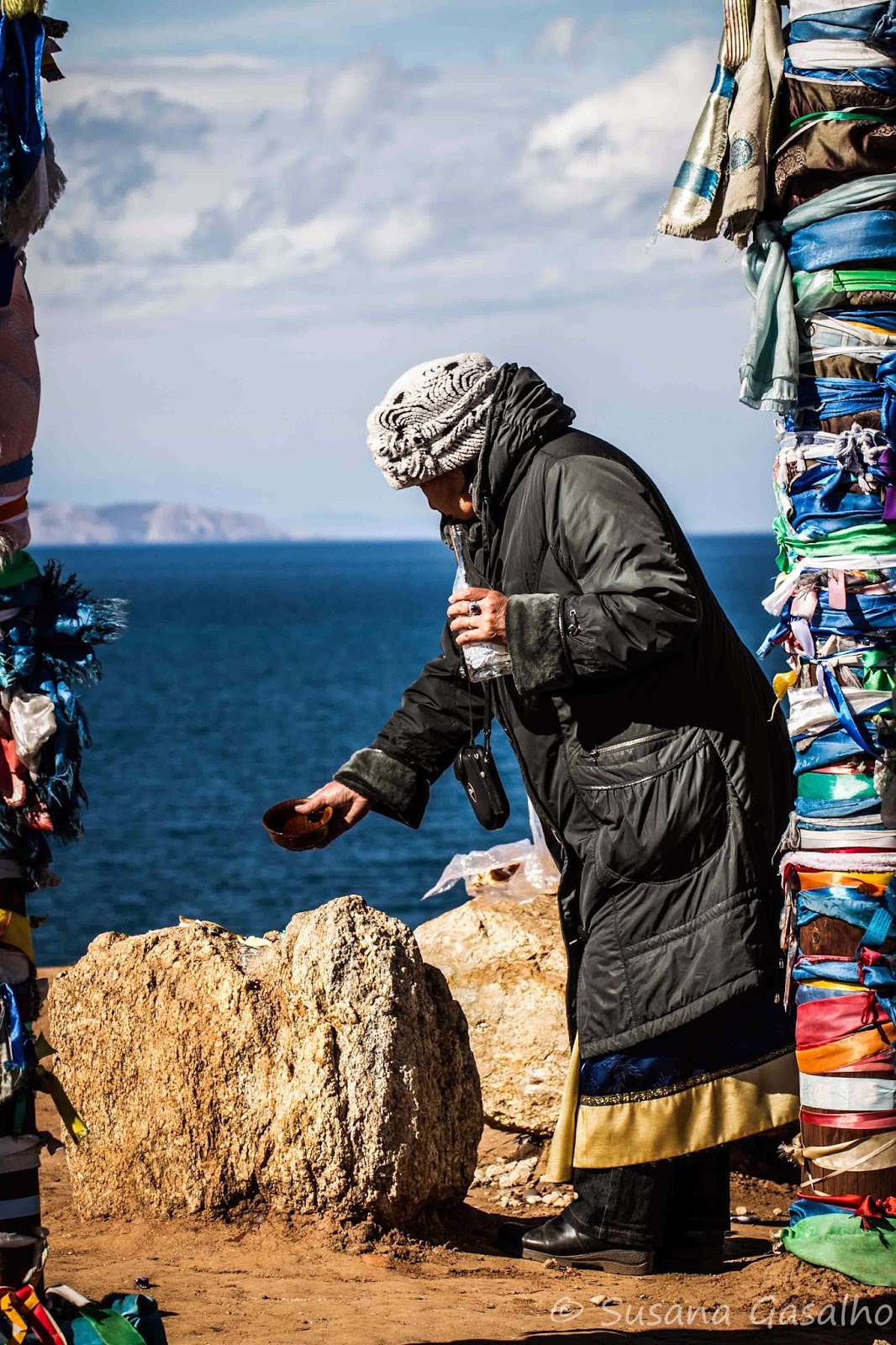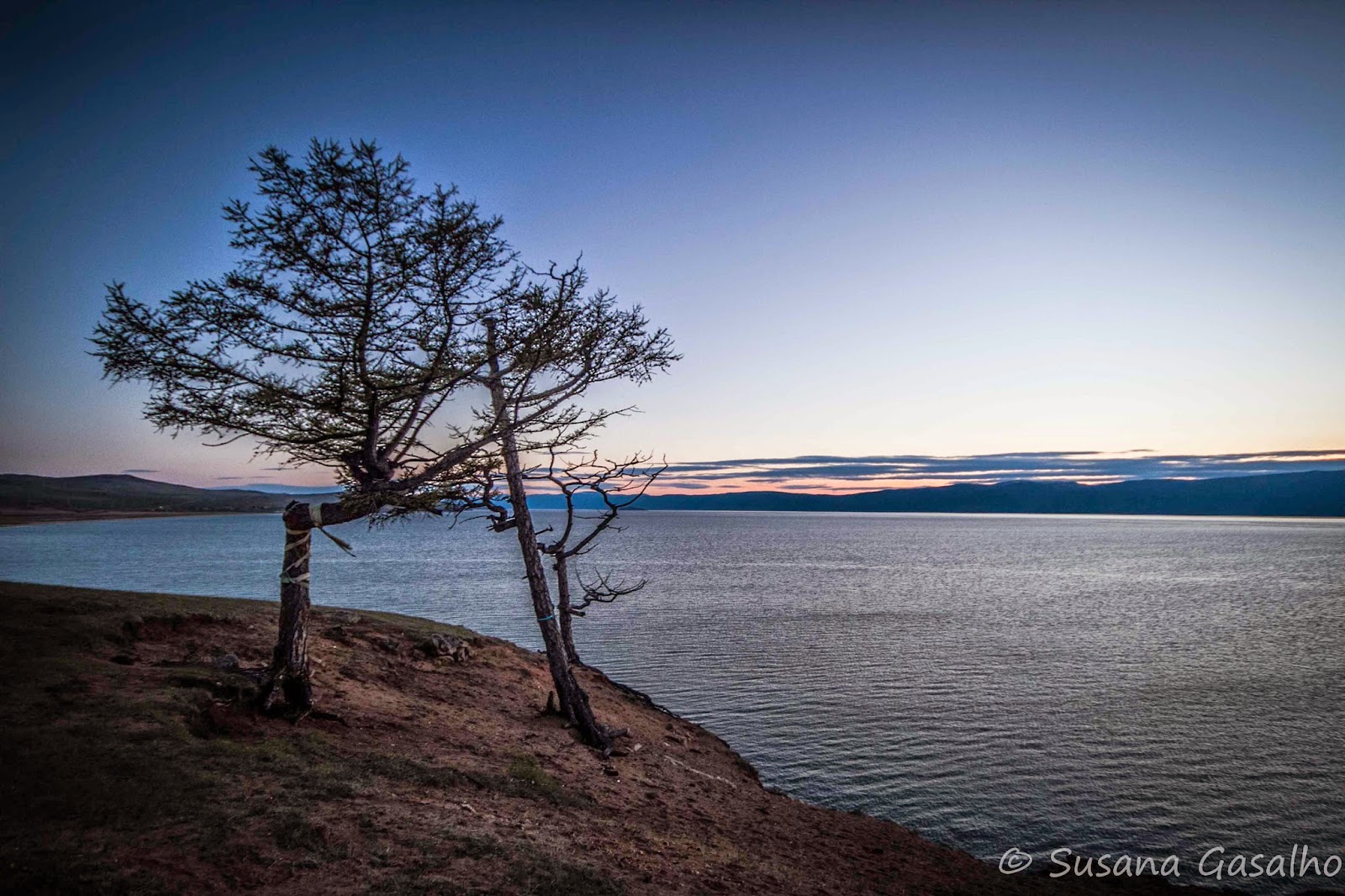 |
| Transmongolian: on our way to Mongolia |
 |
| Waiting at the Russian-Mongolian border |
 |
| Waiting...At some point they didn't let us go out of the train |
 |
| Transmongolian: on our way to Mongolia |
 |
| Friendship can grow fast during the trip. Lucie and Gary, good friends! |
Desta vez apanhámos um comboio chinês que
faz a viagem directamente de Moscovo até Pequim.
Deixamos Ulan-Ude e tanto por explorar
nas redondezas do Baikal.
Mas como em todo o lado, nunca será
possível ver tudo!
Este comboio, em tudo igual aos outros em
que andámos, tem controladores apenas masculinos e as casas de banho são menos
asseadas e não têm papel. As camas são menos confortáveis e os lençóis não vêm
fechados em plásticos. Parece que alguém já os pode ter usado antes. Na altura
não o percebi, mas agora que escrevo com algum tempo de atraso, vejo que o
nosso primeiro comboio chinês era um prenúncio das mudanças a encontrar ao
entrarmos na China.
Na nossa cabine viaja um húngaro, o Gary,
como se apresentou, embora o seu nome seja Görgö. Ele, a francesa da cabine ao
lado, Lucie e um chinês que está noutra cabine da mesma carruagem (que diz para
o chamarmos de Sunshine pois é o que o seu nome significa simplificadamente) já
vêm directamente de Moscovo sem parar, o que significa que já estao há uns dias
no comboio.
O Gary tem pouco tempo e por isso diz que
gostaria de fazer a viagem novamente com mais tempo. Esta viagem de comboio não
é longa, mas torna-se demorada devido à longa espera de 2h na fronteira da
Rússia para fiscalizarem tudo, e mais 2h na fronteira da Mongólia. Fiscalizam
tudo de novo. Vêem debaixo das camas, cães a passarem no corredor, preencher
formulários... no entanto, é importante destacar que, ao contrário do que
sempre ouvi falar, o comboio é seguro, os russos são muito simpáticos e sempre
pudemos deixar tudo nas carruagens e ir passear sem nos preocuparmos em deixar
tudo preso com cadeados ou amarrado.
Esta viagem foi feita de conversas. Com o
Gary discutimos a situação económica na Hungria, o nazismo na Europa, o porquê
desta viagem e a procura de um caminho e sentido para cada uma das nossas
vidas. Esta busca constante e ao mesmo tempo, fuga a uma vida pré-concebida
pela sociedade, que dita o que é mais e menos certo nos curtos e milagrosos
espaços de tempo a que chamamos vida, e que deveriam ser sentidos da maneira
que cada um quer. Não há fórmulas certas porque, do fim, é o que todos mais
sabemos e temos certo.
O Gary trabalha em hotelaria na Suiça,
mas planeia voltar ao seu país, comprar apartamentos e alugá-los. Não quer uma
vida presa e trabalhar para outros para sempre, diz ele. Vai fazer 30 anos
durante esta viagem e veio fazê-la precisamente para pensar na vida.
No comboio conheceu a Lucie, que vai
estar 3 meses na Mongólia a trabalhar numa agência de viagens porque estudou
turismo sustentável. Depois disso planeia ensinar francês na Galiza para
treinar o espanhol e depois vai querer aprender português.
Às tantas o “Sunshine” juntou-se a nós e
estávamos os 5 a rir e a conversar na cabine. Foi uma excelente viagem porque
estes momentos de convívio são o que mais deixam recordações e criam empatias
com os outros. Às vezes fazem-se amigos para a vida e conhecem-se outros
estilos de vida e ideais.
A paisagem manteve-se verde e plana com
alguns rios e montes ao fundo.
Chegámos bastante cedo a Ulan-Bator,
ainda dormia em pé e já estávamos a ser abafados por uma multidão de mongóis à
saída do comboio. Tentavam angariar pessoas para táxis, hotéis ou esperavam
alguém com cartazes.
Demasiado cedo para acompanhar tanta
actividade... Lá encontrámos a pessoa que nos esperava para nos levar ao hostel
e descansar um bocado.
//
This time we took a Chinese train that makes
the trip directly from Moscow to Beijing.
We left Ulan-Ude and so much left to explore around
Baikal.
But like everywhere, you can never see
everything!
This train, identical to the others we've been
taking, has only male controlers and bathrooms are less neat and have no toilet
paper. The beds are less comfortable and the sheets did not come sealed in
plastic. Looks like someone already may have used it before. Not realized at
the time, but now that I write with some time in delay, I see that our first
Chinese train was a presage of the changes to find when entering China.
In our cabin travels a Hungarian, Gary, as he presented
himself, although his name is Görgö. He, the French in the next cabin, Lucie and a Chinese that travels in
the same car in another cabin (he says to us to call him “Sunshine”, because
that's what his name means in a simplified way) have come directly from Moscow without
stopping, which means that they are in the train for a few days now.
Gary has little time and so he says he would like
to make the trip again with more time. This train journey is not long, but it
is time consuming due to the long wait of 2 hours at the Russian border to
oversee everything and more 2h on the Mongolian border. Oversee all over again.
Tehy check under the beds, dogs passing in the hallway, filling out forms ...
however, it is important to note that, contrary to what I heard, the train is
safe, the Russians are very friendly and we always leave everything in the
carriages and go sightseeing without worrying about leaving it stuck with padlocks
or tied.
This trip was made of conversations. With
Gary discussed the economic situation in Hungary, Nazism in Europe, the why for
this trip and the search for a path and direction for each of our lives. This
constant search and at the same time, escape to a life preconceived by society
that dictates what is more and less certain in the short and miraculous space
of time we call life, and that should be felt in the way that each one wants.
There are no right formulas because, the end is what everyone knows and have for
certain.
Gary works in hospitality in Switzerland, but
plans to return to his country, buy apartments and rent them. He doesn’t want a
stuck life and work for others forever, he says. He will turn 30 during this
trip and travels precisely to make himself think about life.
On the train he met Lucie, who will be 3
months in Mongolia to work in a travel agency because she studied sustainable
tourism. After that, she plans to teach French in Galicia to practice spanish
and then will want to learn portuguese.
At some point "Sunshine" joined us
and the we laughed and talked in the cabin. It was a great trip because these moments
are what leave more memories and create empathy with others. Sometimes can make
friends for life and get to know other lifestyles and ideals.
The landscape remained green and flat with
some rivers and hills in the background.
We arrived early enough to Ulan-Bator, still
sleepy and we were being drowned out by a crowd of Mongols outside the train.
Tried to raise people for taxis, hotels or someone waiting with signs.
Too early to keep up with such activity ... Eventualy
we found the person who was waiting for us to take us to the hostel and rest a
bit.
































